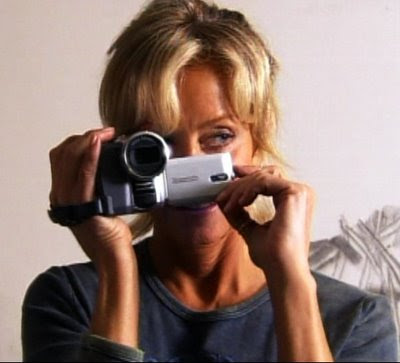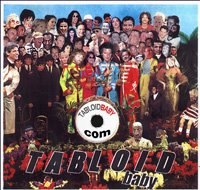
Outrage over Ryan O'Neal producing a sequel to the NBC special Farrah's Story that includes his and Farrah Fawcett's troubled drug addict son Redmond? The storm began even before Farrah's death last June, when Craig Nevius, Farrah Fawcett's production partner on her cancer documentary, A Wing and A Prayer, sued O'Neal, O'Neal and Farrah's longtime business manager Richard B. Francis and Farrah's friend and documentary camerawoman Alana Stewart for pushing him out of the project that became the controversial Farrah's Story. Last month, O'Neal fired back as Francis sued Nevius on behalf of Farrah's estate.
We contacted Craig Nevius, asking for his reaction to this latest twist-- and with an idea for settling at least one part of the sad saga. He responded via email.
What's your reaction to Ryan O'Neal's sequel to Farrah's Story?
I’m sure that any project Ryan or Alana may produce will be of the same quality that most of us have come to know and expect from both of them.
What are the chances of you getting a copy of the original footage and the rights to produce and release the original A Wing and A Prayer director's cut that Farrah wanted made? Would that settle things?
First, let me correct the premise of your question (and a growing misconception born out of the lawsuit that “Farrah’s Estate” filed against me last month): there is no such thing as a “Director’s Cut” of A Wing and A Prayer. While I am (and have always been) the director of the film, every edited version was the “Executive Producers’ Cut.” Meaning it was not only my work but Farrah’s work as well.
The idea that I was working in a vacuum and then, suddenly, after almost two years of editing, simply “presented” her with “my version” is as ridiculous as it is untrue. Anyone who ever got to know Farrah, let alone got the chance to work with her, knows that control was not something that she easily gave up, much less gave into (if someone else tried to exert it). And while Farrah had many talents, biting her tongue was not one of them. She always insisted that people around her “say what you mean and mean what you say.” And she did the same. In my experience, Farrah rarely changed her mind.

Even though Farrah couldn’t be in the editing room on a daily basis, we spoke almost every day, usually several times a day, often for hours on end. And we screened new scenes and/or sequences together every two or three weeks (unless she was in Germany, but even then we tried to speak once a week even if it was at 4:30 in the morning Los Angeles time). Changes to the film were made based on her artistic vision as well as her medical condition: which means both her triumphs and setbacks dictated our direction. She was, after all, still living the “story” we were telling.
But what she made clear to me early on was that if it suddenly became apparent that the end was near, we needed to make sure that the story in the film ended first. Because Farrah never wanted this project (or its promotion) to be about death. She wanted it to be about the fight for a chance at life. That’s why we chose to use “I Run For Life," Melissa Etheridge’s inspirational anthem to cancer patients everywhere, near the end of the documentary. Farrah’s video diary was never supposed to rely on talking heads to narrate the story, much less reminisce about her in the past tense. It was not to be a tribute and it was certainly not meant to be a eulogy. Farrah knew that there would be plenty of those on The Today Show and Entertainment Tonight and if the worst were to happen.
So what about the question we asked: What if you were allowed to release that original documentary so the pubic can have both?
My lawsuit is asking the court to declare that the Sweetened By Risk Agreement (signed by Farrah and by me) is our company’s only legally valid (and therefore controlling) operating agreement. If that is the court’s finding, then yes, A Wing and A Prayer will be seen by the world. But until that time comes, the only audience likely to see it will be the judge and jury.

And that’s only because the accusations made by Richard Francis in the estate’s lawsuit against me made the quality of the work relevant-- when it was not necessarily relevant before (in my lawsuit for contract interference). At least that’s my understanding of it. But you have to remember, my only law degree comes from watching Boston Legal.
Would you accept that?
Yes. My lawsuit has always been primarily about two issues: my rights and my responsibility. That’s how Sweetened By Risk’s Operating Agreement reads. It clearly states that if Farrah becomes unable to function for any reason (including and specifically illness), I not only had the right to make all business and creative decisions for our company, I also had the responsibility to do so.
So you see, even if I wanted to settle for something less than completing the film as Farrah intended, I really couldn’t. At least not if I wanted to live with myself. Sure, money would be great. But I know that it wouldn’t last nearly as long as the guilt I would feel for selling out Farrah. She fought too long and too hard for me not to do the same.
Has the other side offered to settle with you for money?
Whether they did or not, I wouldn’t be able to talk about it.
It sounds simple enough: Show us the movie. Farrah's fans, O'Neal's supporters, and the world will only be richer for getting even more insight into Farrah, and seeing her ordeal through her own eyes.
The lawsuits would be settled and everyone involved could be satisfied that Farrah is indeed "resting in peace."
Ryan? Bernie?
We contacted Craig Nevius, asking for his reaction to this latest twist-- and with an idea for settling at least one part of the sad saga. He responded via email.
What's your reaction to Ryan O'Neal's sequel to Farrah's Story?
I’m sure that any project Ryan or Alana may produce will be of the same quality that most of us have come to know and expect from both of them.
What are the chances of you getting a copy of the original footage and the rights to produce and release the original A Wing and A Prayer director's cut that Farrah wanted made? Would that settle things?
First, let me correct the premise of your question (and a growing misconception born out of the lawsuit that “Farrah’s Estate” filed against me last month): there is no such thing as a “Director’s Cut” of A Wing and A Prayer. While I am (and have always been) the director of the film, every edited version was the “Executive Producers’ Cut.” Meaning it was not only my work but Farrah’s work as well.
The idea that I was working in a vacuum and then, suddenly, after almost two years of editing, simply “presented” her with “my version” is as ridiculous as it is untrue. Anyone who ever got to know Farrah, let alone got the chance to work with her, knows that control was not something that she easily gave up, much less gave into (if someone else tried to exert it). And while Farrah had many talents, biting her tongue was not one of them. She always insisted that people around her “say what you mean and mean what you say.” And she did the same. In my experience, Farrah rarely changed her mind.

Even though Farrah couldn’t be in the editing room on a daily basis, we spoke almost every day, usually several times a day, often for hours on end. And we screened new scenes and/or sequences together every two or three weeks (unless she was in Germany, but even then we tried to speak once a week even if it was at 4:30 in the morning Los Angeles time). Changes to the film were made based on her artistic vision as well as her medical condition: which means both her triumphs and setbacks dictated our direction. She was, after all, still living the “story” we were telling.
"Farrah never wanted this project
to be about death.
She wanted it to be about
the fight for a chance at life."
to be about death.
She wanted it to be about
the fight for a chance at life."
But what she made clear to me early on was that if it suddenly became apparent that the end was near, we needed to make sure that the story in the film ended first. Because Farrah never wanted this project (or its promotion) to be about death. She wanted it to be about the fight for a chance at life. That’s why we chose to use “I Run For Life," Melissa Etheridge’s inspirational anthem to cancer patients everywhere, near the end of the documentary. Farrah’s video diary was never supposed to rely on talking heads to narrate the story, much less reminisce about her in the past tense. It was not to be a tribute and it was certainly not meant to be a eulogy. Farrah knew that there would be plenty of those on The Today Show and Entertainment Tonight and if the worst were to happen.
So what about the question we asked: What if you were allowed to release that original documentary so the pubic can have both?
My lawsuit is asking the court to declare that the Sweetened By Risk Agreement (signed by Farrah and by me) is our company’s only legally valid (and therefore controlling) operating agreement. If that is the court’s finding, then yes, A Wing and A Prayer will be seen by the world. But until that time comes, the only audience likely to see it will be the judge and jury.

And that’s only because the accusations made by Richard Francis in the estate’s lawsuit against me made the quality of the work relevant-- when it was not necessarily relevant before (in my lawsuit for contract interference). At least that’s my understanding of it. But you have to remember, my only law degree comes from watching Boston Legal.
Would you accept that?
Yes. My lawsuit has always been primarily about two issues: my rights and my responsibility. That’s how Sweetened By Risk’s Operating Agreement reads. It clearly states that if Farrah becomes unable to function for any reason (including and specifically illness), I not only had the right to make all business and creative decisions for our company, I also had the responsibility to do so.
So you see, even if I wanted to settle for something less than completing the film as Farrah intended, I really couldn’t. At least not if I wanted to live with myself. Sure, money would be great. But I know that it wouldn’t last nearly as long as the guilt I would feel for selling out Farrah. She fought too long and too hard for me not to do the same.
Has the other side offered to settle with you for money?
Whether they did or not, I wouldn’t be able to talk about it.
***
It sounds simple enough: Show us the movie. Farrah's fans, O'Neal's supporters, and the world will only be richer for getting even more insight into Farrah, and seeing her ordeal through her own eyes.
The lawsuits would be settled and everyone involved could be satisfied that Farrah is indeed "resting in peace."
Ryan? Bernie?

























































